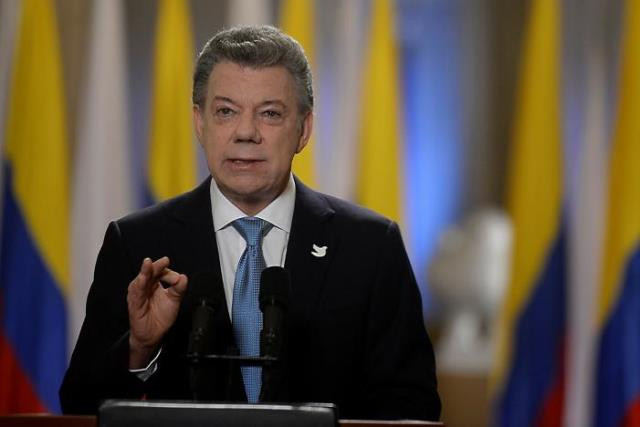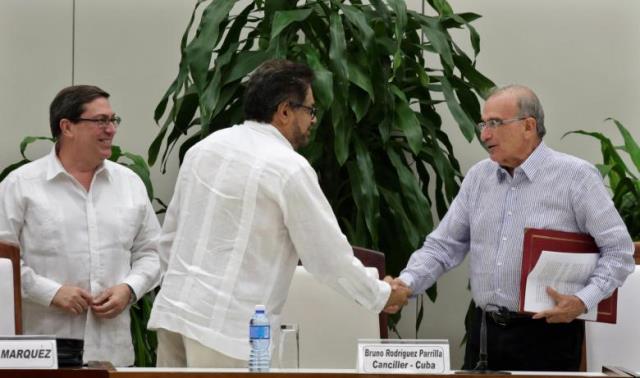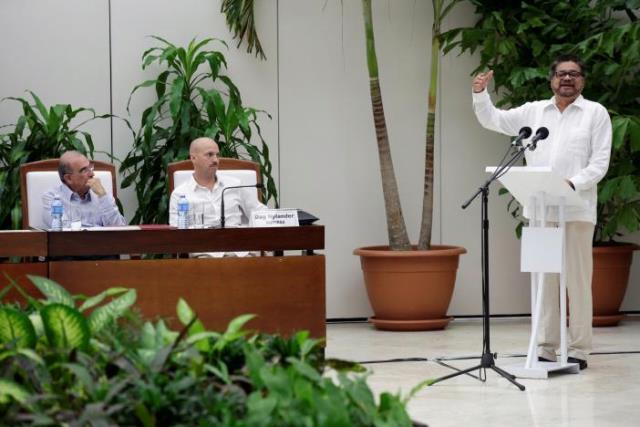Colombia, rebels agree revised peace deal to end 52-year war
The government and Revolutionary Armed Forces of Colombia, said they had incorporated proposals from the opposition

Colombia's President Juan Manuel Santos speaks during a Presidential address in Bogota, Colombia, November 12, 2016. PHOTO: REUTERS
The government and Revolutionary Armed Forces of Colombia, which have been holding talks in Havana for four years, said they had incorporated proposals from the opposition, religious leaders and others. President Juan Manuel Santos hopes to unite the divided nation behind the new deal after the peace process was endangered by its rejection in the October plebiscite. Colombian voters were deeply split, with many worried the FARC would not be punished for crimes and others hopeful the deal would cement an end to violence.
 Colombia's FARC lead negotiator Ivan Marquez (C) and Colombia's lead government negotiator Humberto de la Calle shake hands while Cuba's Foreign Minister Bruno Rodriguez looks on, after signing a new peace deal to end their 52-year war in Havana, Cuba, November 12, 2016. PHOTO: REUTERS
Colombia's FARC lead negotiator Ivan Marquez (C) and Colombia's lead government negotiator Humberto de la Calle shake hands while Cuba's Foreign Minister Bruno Rodriguez looks on, after signing a new peace deal to end their 52-year war in Havana, Cuba, November 12, 2016. PHOTO: REUTERS"We call upon all Colombia and the international community... to back this new accord and its quick implementation so as to leave the tragedy of war in the past," the two sides said in a statement. "Peace cannot wait anymore."
Colombia's ELN rebels kill two in 'terrorist act': military
Copies of the new accord will be made public from Sunday. The government has not addressed holding a second plebiscite to approve the deal, though some opposition figures were already demanding one via Twitter. The new deal will not modify a controversial part of the accord that gives the FARC 10 congressional seats through 2026 or prevent rebel leaders from eventually being elected to political posts. However, the accord will not be integrated into Colombia's constitution and the FARC will be required to present a complete inventory of its assets, which are destined for victim compensation, Santos said in a televised address.
The modified accord also takes foreign magistrates off special peace tribunals, although there will be foreign observers, and stipulates the FARC must turn in exhaustive information about its involvement in the drug trade. The new deal limits the work of the special tribunals to 10 years and requires any investigations be opened within the first two years.
A key concern among those who voted "no" on the initial deal is that convicted rebels will not serve jail time and will instead remove land mines and do other reparations work. It seemed unlikely modifications would include prison time, but Santos said the deal would ensure FARC fighters sentenced by the special court will be restricted to certain areas, living arrangements and work hours.
An opposition suggestion that FARC leaders not be allowed to run for office once they have finished their alternative sentences was not debated with the rebels, Santos said.
 Colombia's FARC lead negotiator Ivan Marquez (R) dresses the audience while Colombia's lead government negotiator Humberto de la Calle (L) and mediator Dag Nylander of Norway look on, after signing a new peace deal to end their 52-year war, in Havana, Cuba November 12, 2016. PHOTO: REUTERS
Colombia's FARC lead negotiator Ivan Marquez (R) dresses the audience while Colombia's lead government negotiator Humberto de la Calle (L) and mediator Dag Nylander of Norway look on, after signing a new peace deal to end their 52-year war, in Havana, Cuba November 12, 2016. PHOTO: REUTERS"It is very important Colombians understand that the reason for all peace processes in the world is precisely that rebels lay down arms and can participate in legal politics," Santos said.
"Our process with the FARC is not and cannot be an exception."
Colombia peace deal to be signed September 26
Former President Alvaro Uribe, who led opposition to the original accord, was not pleased with the modified deal, sources said. Uribe, who met with Santos on Saturday, said his camp and victims should be able to study the new deal before it is implemented.
"I have asked the president that the texts they announce in Havana not be definitive," he said in a statement, adding that the opposition might want to make further tweaks.
Santos won the Nobel Peace Prize last month for his efforts to end the war, which has killed more than 220,000 and displaced millions.



















COMMENTS
Comments are moderated and generally will be posted if they are on-topic and not abusive.
For more information, please see our Comments FAQ